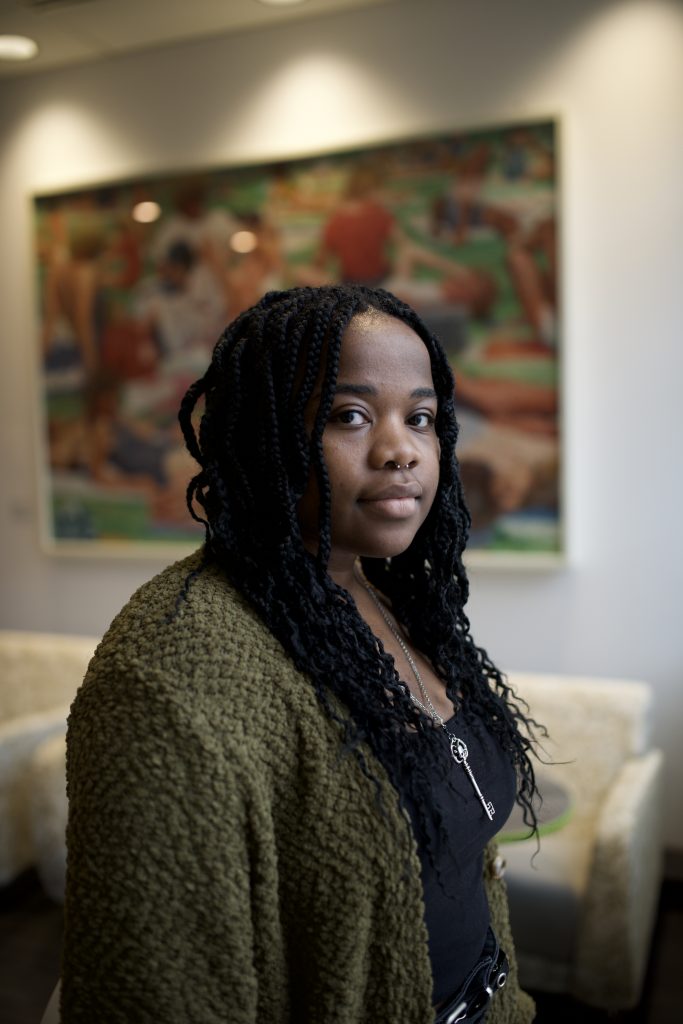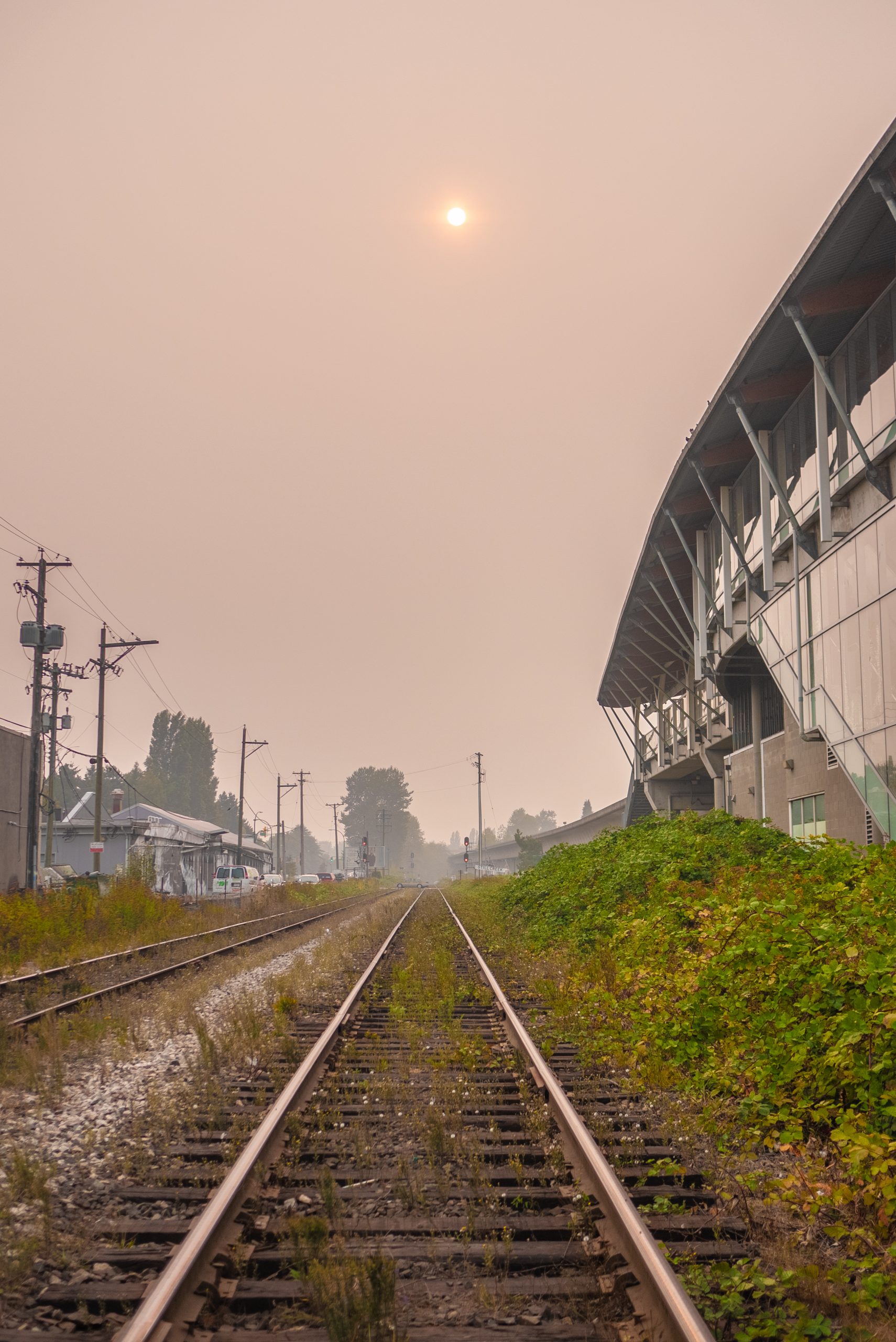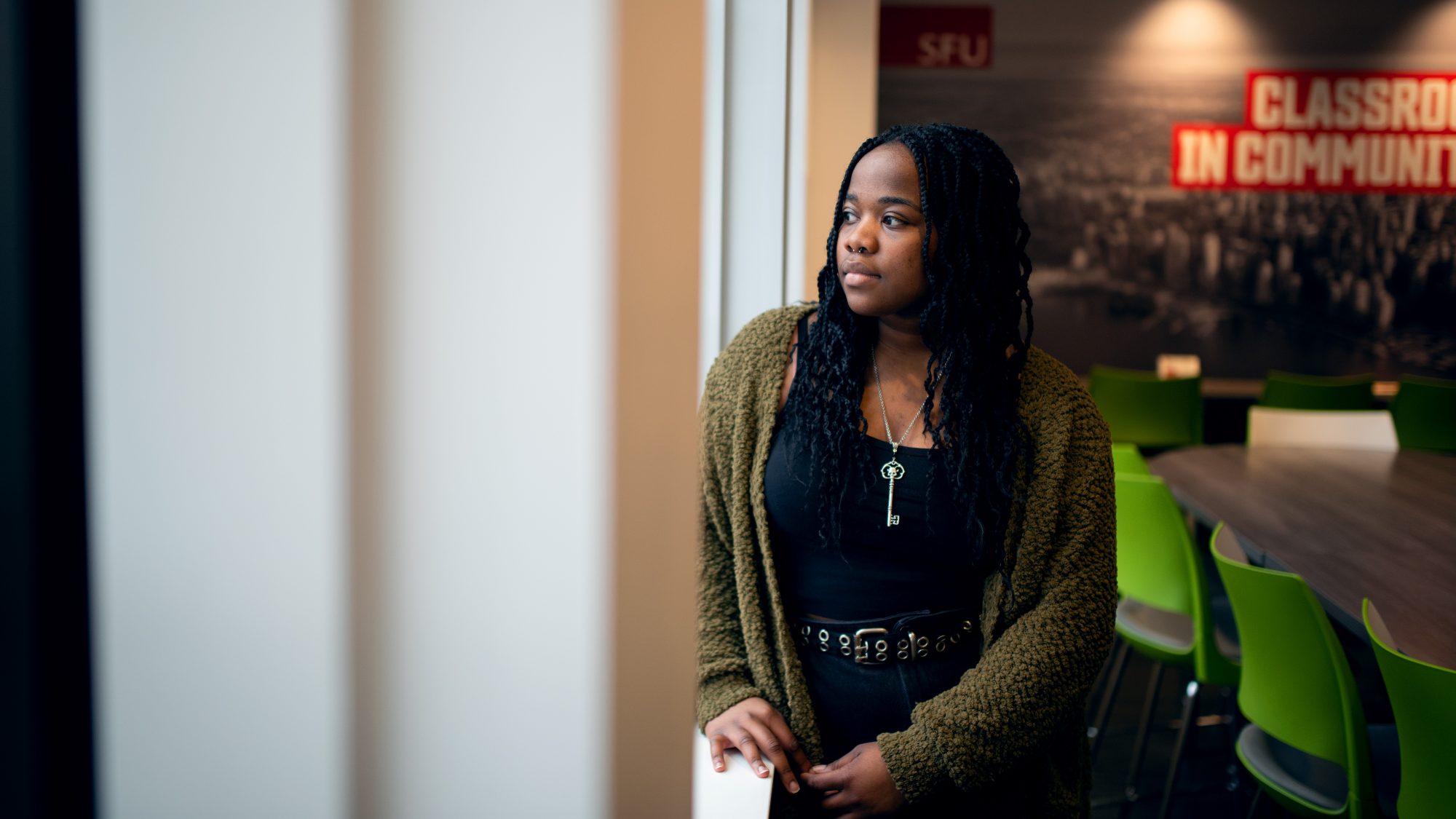Living climate change is a series of personal stories from university students in British Columbia who have lived through climate-related emergencies and disasters.
by Divine Lwamba, as told to Nola Stenstrom
Photos by Phil MacLachlan
Divine has always been interested in activism and social justice. “I recall when I was younger, there was a kid on the bus who was getting bullied by others for things that he couldn’t control. So, me and my friends decided to make an anti-bullying group,” said Divine. “That’s my first experience really knowing that this is what I want to do.” Now, as a communication student at Simon Fraser University, she’s “trying to figure out” how to integrate that interest in activism and social justice with music. But, when she’s not figuring that out, she lives with her mom and three younger brothers, in a small townhouse. And that’s where they were when the Western North America heat wave blanketed British Columbia’s Lower Mainland.
I live on the top floor and my window is always facing the sun so I get the most heat in the house out of everyone. We don’t have an air conditioner and we couldn’t really afford one at the time because everyone was trying to buy one. They were sold out or they were skyrocketing the prices.
I’m someone that’s pretty sensitive to heat. I struggle with sensory issues on a daily basis but I especially don’t do well with the heat and it affects me overall. It was tough because we felt like there was nowhere for all of us to get away. Not necessarily get away from each other, but just to cope through it. We felt like we were very trapped in that sense.
A lot of community spaces were being promoted as spaces for people to go and cool off. My brothers would often go to our dad’s house. His place was definitely a lot cooler and it was in the shade. That would happen sometimes or we would set up fans in our house.
Every single day, I was searching up how to cool down. I tried almost everything. I would blackout my room with curtains. I would turn the fan on at night and place it right at the window. I would spray water at the fans so it would create a mist. I had a bunch of hand fans. I would take a bunch of cold showers.
“My room is usually my safe space but I remember feeling so unsafe in that room.”
— Divine Lwamba
There was multiple times during the summer where you would walk out and you could not see much. I could actually smell a lot of the smoke because we did have a few fires in the summer in the Lower Mainland area. I remember waking up one morning, my room smelled really bad, like fire. I looked outside and it was just completely foggy, smokey and scary. I was worried. I would try to distract myself with music or TV or talking to my friends on the phone.
When my friends and I would try and go out downtown, people wouldn’t even want to dance. Most of us were standing outside trying to fan ourselves like, “It’s too hot to even have fun right now.” To have the summertime that I typically look forward to be this insufferable experience was really frustrating. There’s so much I want to be doing. I feel so awful and there’s nothing I can do. It was this really weird back-and-forth going on in my head. What can I even do about this? Is it going to be worse next year?

I was feeling so stuck. Even if I went outside, I’ll feel hot. If I stay inside, I feel hot. I felt so helpless because there wasn’t anywhere I could go. I spent a lot of it just in my bed. Just really unable to do anything. My room is usually my safe space but I remember feeling so unsafe in that room: uncomfortable and really trapped in there.
“I felt alone”
The heat was really starting to affect my mental health and I was struggling to cope. It was just so consuming and overwhelming: just thinking like, “Does anyone else feel this way? Is it affecting anyone this badly? Am I just being dramatic? Should I just push through it?” It was getting to a point where there was nothing else I could think about. It was really bad. All I could think of was I can’t wait for winter, I can’t wait for this to be over.

“Are things going to change?
I really hope so.”
While wildfires blaze across the interior of British Columbia, urban areas sit under an oppressive blanket of smoke.
Credit: Lucas Green
We’ve never experienced this kind of thing and I’ve only lived here in B.C., so it was definitely something new. It was hard to make quick changes and adapt. It’s something I think about almost every day now. The heat wave made it so hard to live in that moment. It makes me think of what’s going to happen in the future. I just feel like I live in this constant state of anxiety for the summer months and how I’m going to get through it.
The heatwave ended around August. We had a pretty hot September but then we had some rainfall. That first rainfall was definitely a sight that I keep with me. I love the rain. It might be because I’ve lived here my whole life, but there’s something so calm and peaceful about it, and I feel like everyone moves a little slower when it’s rainy and a bit gloomy outside.
I was like, “Okay, I’m glad that it’s away now,” but I almost couldn’t even fully enjoy that sense of relief, because I was like, next year, it’s just going to come back again and probably hit ten times harder. It just really made me realize, “Oh, my gosh, this is happening now.” We need to do something. It was really impactful. Are things going to change? I really hope so.
This testimony was co-created by members of the Climate Disaster Project at the University of Victoria, in partnership with Simon Fraser University and the 2023 Global Media Education Summit. The Climate Disaster Project is an international teaching newsroom that works with disaster-affected communities to document and investigate their stories. For more information, please visit www.climatedisasterproject.com.
